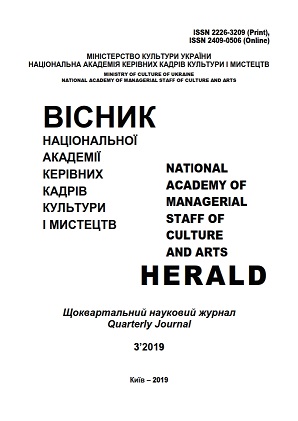«The Triumphal Song» By J. Brahms at the Context of the German Spiritual, Historical and Musical Tradition of the Second Half of the XIX Century
«The Triumphal Song» By J. Brahms at the Context of the German Spiritual, Historical and Musical Tradition of the Second Half of the XIX Century
Author(s): Anzhelika Anatoliyivna TatarnikovaSubject(s): Christian Theology and Religion, Cultural history, Music, 19th Century, Sociology of Religion, History of Art
Published by: Національна академія керівних кадрів культури і мистецтв
Keywords: «The Triumphal Song» by I. Brahms; choral art by I. Brahms; Protestantism; German culture; Protestant choir; Christian praise;
Summary/Abstract: The purpose of the article is to identify the genre-intonational uniqueness of the «Triumphal Song» by J. Brahms in the spirit of the style and style of German culture and music of the second half of the XIX century. The methodology of the work is based on the intonation concept of music from the perspective of stylistic, etymological analysis, as well as on the interdisciplinary, historical and culturological approaches, which allow revealing the spiritual-semantic and poetic-intonational features of the «Triumphal Song» by I. Brahms. The scientific novelty of the research is determined by its analytical perspective, which takes into account not only the genrestyle specificity of the composer's work but also the organic elements of its interaction with the German national spiritual and religious tradition, which was actualized during the formation of the German Empire. Conclusions. The generalization of the spiritual-semantic and intonational indicators of the «Тriumphal Song» by J. Brahms indicates that the title work originated at the intersection of the composer's neoclassical and non-architectural quest, as well as the centuries-old traditions of the German Protestant culture, guided by its basic spiritual settings. Among the latter, a significant place belongs to the imperative of God‘s glory, which determines the spiritual meaning of being a person and his creative self-realization. Its essence in conjunction with the German national imperial idea is also embedded in the content of «The Triumphal Song» by I. Brahms, whose genre ambiguity, synthesizing the typology of German Lied, Te Deum, and Protestant hymnology, reflected in the music-intonational language and hymn-choral quotes organic unity. German spiritual and state-imperial world perception of the second half of the XIX century.
Journal: Вісник Національної академії керівних кадрів культури і мистецтв
- Issue Year: 2019
- Issue No: 3
- Page Range: 342-347
- Page Count: 6
- Language: English

